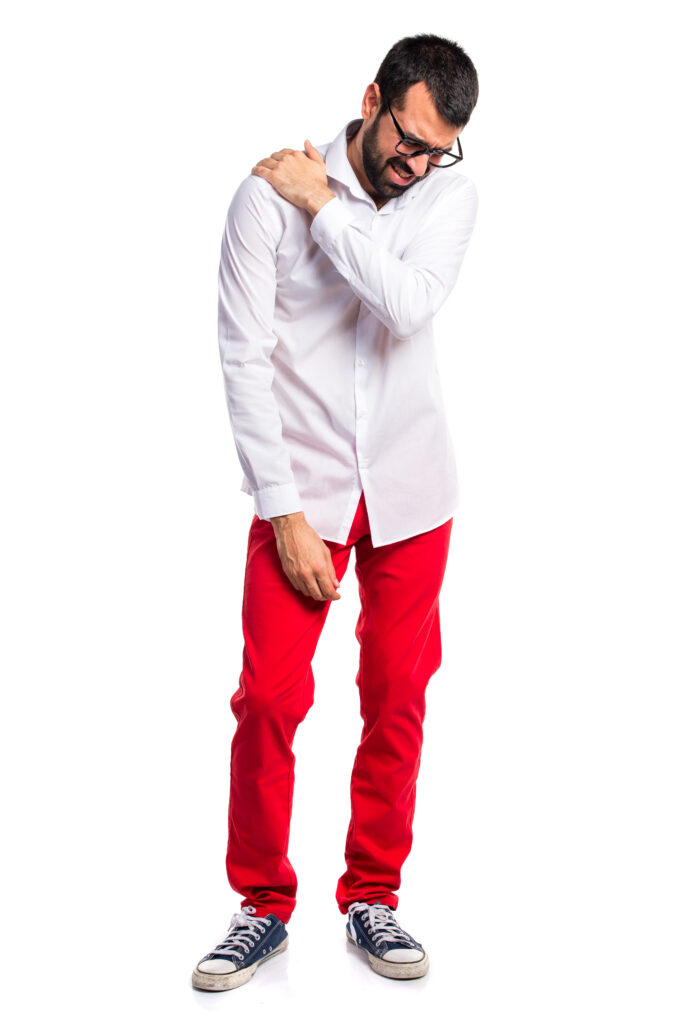Below is a range of typical conditions linked to shoulder pain, and they may differ in their underlying causes, symptoms, and degree of seriousness. Seeking guidance from One of our chiropractors or any other healthcare provider for a thorough diagnosis and appropriate treatment is crucial if you’re encountering shoulder discomfort.
Excellence is our Standard
Check out our reviews; every single one of them shines with 5 golden stars.

Shoulder Pain: Shoulder pain can result from various causes, including rotator cuff injuries, tendinitis, bursitis, arthritis, or referred pain from the neck or upper back.
Shoulder Stiffness: Stiffness in the shoulder joint can occur due to conditions like a frozen shoulder (adhesive capsulitis), arthritis, or overuse.
Shoulder Swelling: Swelling in the shoulder area can result from bursitis, tendinitis, injury, or inflammatory conditions like arthritis.
Shoulder Limited Range of Motion: Reduced range of motion in the shoulder may be due to shoulder impingement, rotator cuff tears, or a frozen shoulder.
Shoulder Instability: Shoulder instability can occur due to ligament laxity or repeated dislocations, leading to a feeling of the shoulder “coming out of place.”
Shoulder Popping or Clicking: Audible sounds like popping or clicking in the shoulder joint can be related to conditions such as labral tears, bursitis, or joint inflammation.
Radiating Arm Pain: Pain that travels from the shoulder down the arm may be caused by nerve compression, such as in cervical radiculopathy or thoracic outlet syndrome (TOS).
Shoulder Numbness or Tingling: Sensations of numbness or tingling in the shoulder, arm, or hand can result from nerve compression, as seen in conditions like thoracic outlet syndrome or pinched nerves.
Shoulder Grinding Sensation: A grinding or grating sensation in the shoulder joint may be associated with arthritis or degenerative changes.
Shoulder Muscle Atrophy: Wasting or shrinking of shoulder muscles can occur due to nerve damage or disuse following an injury.
Shoulder Fatigue or Heaviness: A feeling of shoulder fatigue or heaviness can result from muscle strains, overuse, or underlying medical conditions.
Chiropractic care for shoulder conditions may include spinal and shoulder joint adjustments, soft tissue therapies, exercises, and postural advice. The effectiveness of chiropractic care for these conditions can vary from person to person.
If you’re experiencing any of the mentioned shoulder issues, don’t hesitate to reach out to us.
Our team of experienced professionals at igood Health Centre is here to help you find relief and get back to a pain-free life.
1. Rotator Cuff Injuries
2. Shoulder Impingement Syndrome
3. Frozen Shoulder (Adhesive Capsulitis)
4. Bursitis
5. Thoracic Outlet Syndrome
6. Shoulder Instability
7. AC Joint Sprains (Separated Shoulder)
8. Labral Tears
9. Shoulder Arthritis
10. Muscle Strains and Tension
11. Referred Pain from the Neck
12. Adhesive Bursitis
13. Impingement of Suprascapular Nerve
14. Tendonitis (Biceps or Triceps)
15. Postural Strain
